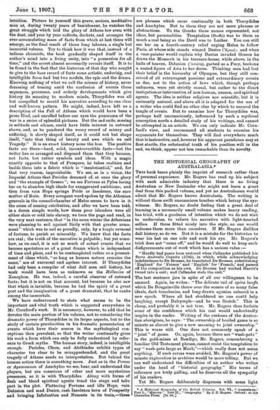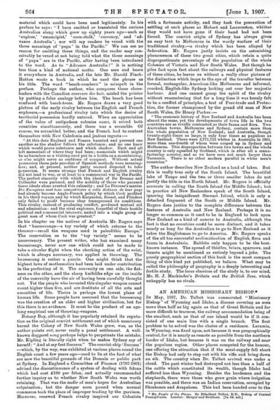THE HISTORICAL GEOGRAPHY OF AUSTRALASIA.* THIS book bears plainly the
imprint of research rather than of personal experience. Mr. Rogers has read up his subject with such admirable industry that there is no living Australian or New Zealander who might not learn a great deal from this packed volume, and yet no Australasian would admit that Mr. Rogers knows Australasia. The writing is without those swift unconscious touches which betray the eye- witness. Mr. Rogers, no doubt feeling that a great deal of learning in a necessarily small volume makes heavy reading, has tried, with a goodness of intention which we do not wish to undervalue, to relieve his narrative with light-hearted sallies. If these fitted nicely into the style, no one would welcome them more than ourselves. If Mr. Rogers dislikes dull history, so do we. But it is a mistake for the historian to wear his hat on one side and cock his eye. Mr. Rogers's trick does not "come off," and he would do well to keep such disfigurements out of work which has a serious value :— " Hardly had peace been restored when Callender published his Terra Andra/is Cognac; (1766), in which, while acknowledging indebtedness to De Brasses, he translated De Brasses, substituting
'England' for France' and 'English' for 'French,' and Passed off the composition as his own. De Brasses had worked Harris's
tweed into a spit; and Callender stole the snit."
The last sentence jars in spite of all our willingness to be amused. Again, he writes "The delicate veil of opira bouffe which De Bougainville threw over the scenes of so many false ideals, dark treacheries, and long-drawn agonies ushered in a new epoch. Where all had shuddered no one could help laughing, except Dalrymple—and he was Scotch." This is cheap, and probably it is not true. Mr. Rogers thus forfeits some of the confidence which his zeal would undoubtedly inspire in the reader. Writing of the customs of the Austin. lien aborigines, he says : "The ownership of broiled game is so minute as almost to give a new meaning to joint ownership." Thia is worse still. One does not commonly speak of a " joint " of game. Or, again, because there are " wash-pota " in the gold-mines at Idendigo, Mr. Rogers, remembering a familiar Old Testament phrase, cannot resist the temptation to say " wash-pots large as loioab,"--whicli really does not mean anything. If such errors were avoided, Mr. Rogers's newer of minute exploration in archives would be more telling. But we can well understand the difficulties of an author who writes under the head of " historial geography." His terms of reference are truly galling, and he deserves all the sympathy of his readers. .
Yet Mr. Rogers deliberately dispenses with some light
• A Historical Geography of the Brilish Colonies. Vol. VI., Arnstralasia.. Part I., “Iffshory." Part II., " Geographr." Bi 7. D. Iloger. Oxford: at the Clarendon material which could have been used legitimately. In his preface be says: "I have omitted or translated the curious Australian slang which 'grew up eighty years ago—such as expiree,'. emencipist," corn-stalk,' 'currency,' and 'ad- vance Australia '; nor will my readers be vexed with the three meanings of 'papa ' in the Pacific." We can see no reason for omitting these things, and the reader may con- ceivably be vexed at not being told what, the three meanings of " papa" are in the Pacific, after having been introduced to the word. As to "Advance Australia!" it is nothing less than a kind of national motto. One sees and hears it everywhere in Australia, and the late Mr. Harold Finch- Hatton wrote a book in which he used the phrase as his title. The word " beach-combers " is misspelt in the preface. Perhaps the author, who compares these shore- loafers with the Canadian coureurs des Lois, misled the printer by putting a false analogy before him. The beach has been confused with Leech-trees. Mr. Rogers draws a very good picture of the early rivalry between the English and French explorers,—a professional rivalry into which the desire of territorial possession hardly entered, When an appreciation of the value of antipodean colonies came, it seized both countries simultaneously, and there was a scramble. Of course, we scrambled better, and the French had to content themselves with New Caledonia and jealous regrets:— "At this date England and France haunted and pursued one another as the shadow follows the substance ; and no one knew which would prove substance and which shadow. Each and all left memorials of where they had been; memorials which might be as harmless as a visiting-card put in a bottle on a mountaintop, or else might serve as emblems of conquest. Without actual possession these pale parodies of Spaniel: methods were meaning- less; and, at present, neither party seemed disposed to take possession. It seems strange that French and English rivalry did not lead to war, or at least tore commercial war in the Pacific. The perfect sincerity with which the ideals of De Brossos and Callender were pursued, and the nobility of those who pursued these ideals alone averted this calamity ; and La P5rouse's maxim Dos Europeens sent toss compatriotes a cotta distance de law pays had already become Anglo-French policy by which Cook profited in his third voyage and by which Kerguelen, ]tossel, and Flinders only failed to profit because they transgressed its conditions. This rivalry, instead of producing conflict, produced mutual aid and admiration: and the rival explorers, forgetful of their hostile political and commercial interests, united into a single group of great men of whom Cook was greatest."
In his chapter on the natives of Australia Mr. Rogers says that " boomerangs—a toy variety of which returns to the thrower—recall the weapons used in paleolithic Europe." The reservation as to the "toy variety" seems to be unnecessary. The present writer, who has examined many boomerangs, never saw one which could not be made to take a circular flight when the checking action of the wrist, which is always necessary, was applied in throwing. The boamerang is rather a puzzle. One might think that the highest laws of mathematics had been laid under contribution in the perfecting of it. The convexity on one side, the flat- ness on the other, and the sharp knifelike edge on the inside of the convexity have the air of having been carefully thought out. Yet the people who invented this singular weapon cannot count higher than five, and are destitute of all the arts and amenities of life. Theirs is perhaps the lowest plane of human life. Some people have assumed that the boomerang was the creation of an older and higher civilisation, but for this there is no evidence. It must be the product of an age. long empirical use of throwing-weapons.
Botany Bay, although it has popularly retained its reputa- tion as the original convict settlement out of which unsavoury kernel the Colony of New South Wales grew, was, as the author points out, never really a penal settlement. A well- known doggerel song perhaps helps to perpetuate the mistake. Mr. Kipling is literally right when be makes Sydney say of herself: "And at my feet Success." The convict-ship ` Success ' —which, by the way, was exhibited at various places round the English coast a few years ago—used to lie at the foot of what are now the beautiful grounds of the Domain or public park at Sydney. In England a Committee of Finance (1797-1801) advised the discontinuance of a system of dealing with felons which had cost 2180 per felon, and actually recommended further inquiry as to whether New South Wales was worth retaining. That was the nadir of men's hopes for Australian colonisation; but the danger soon passed when normal commerce took the place of improper trading by the garrison. Moreover, renewed French rivalry inspired our Colonists
with a fortunate activity, and they took the precaution of settling at such places as Hobart and Launceston, whither they would not have gone if their hand had not been forced. The convict origin of Sydney has always given an easy text to Melbourne in the wordy warfare of their traditional rivalry,—a rivalry which has been allayed by federation. Mr. Rogers justly insists on the astonishing phenomenon of these two great cities, which retain a quite disproportionate percentage of the population of the whole Colonies of Victoria and New South Wales. But though he piles fact upon fact about the railways and physical features of these cities, he leaves us without a really clear picture of the distinction which leaps to the eye of the traveller between formal, rectangular, American-like Melbourne and, informal, crooked, English-like Sydney looking out over her majestic harbour. And one cannot grasp the spirit of the rivalry without remembering that for a long time it was keenly felt to be a conflict of principles, a test of Free-trade and Protec- tion, the former championed by the grand old man of New South Wales, Sir Henry Parkes "The economic history of New Zealand and Australia has been almost the same, yet the developments of town life in the two countries are as vividly contrasted as their fauna and flora. Two Australian towns, Melbourne and Sydney, contain more than the whole population of New Zealand; and Australia, though twenty-eight times as large, is only four times as populous as New Zealand. There were 8,771,715 whites in Australia in 1901, more than one-fourth of whom were cooped up in Sydney and Melbourne. This disproportion between two towns and the whole country is only equalled by Scotland, which is after all a manu- facturing country, and as we have seen not much larger than Tasmania. There is no other modern parallel in white men's countries."
The author describes New Zealand as a land of lakes. But this is really true only of the South Island. The beautiful lake of Taupe and the two or three smaller lakes do not justify the title in the North Island. Mr. Rogers is officially accurate in calling the South Island the Middle Island ; but in practice all New Zealanders speak of the South Island, ignoring the insignificant Stewart Island. which is only a detached fragment of the South or Middle Island. Mr. Rogers does justice to the complete difference between the features of Australia and New Zealand. Perhaps it is no longer so common as it used to be in England to look upon New Zealand as a kind of annexe to Australia, although the fact is that no countries could be more distinct, and it takes nearly as long for the Australian to go to New Zealand as it takes the Englishman to go to America. Mr. Rogers speaks of the all too successful accliinatisation of English. flora and fauna in Australasia. Rabbits only happen to be the best- known instance. The spread of thistles, briars, sparrows, and linnets might be mentioned as entirely beyond a joke. The purely geographical section of this book is the most compact thing of this kind yet published, we believe. What may be called the philosophy of geography is a deeply interesting and fertile study. The locus dassicus of the study is, to our mind, Mr. H. J. Mackinder's Britain and The British Seas, which unhappily has no rivals.







































 Previous page
Previous page